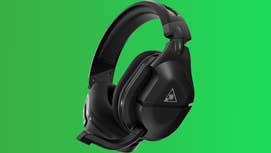-

HIGH VAULTAGE Fallout TV show SPOILERCAST
Amazon’s TV juggernaut isn't afraid to play around in Bethesda's universe, but do we want it to?
-

WTB BOOST World of Warcraft: The War Within preview - delving into an exciting new saga
The first of three new expansions, The War Within makes a great first impression.
-

HENRY'S BACK Kingdom Come: Deliverance 2 continues the realism-obsessed RPG series - and is set to release later this year
Warhorse Studios returns to Bohemia with a sequel to its realism-focused action RPG.
-

VIDEO Dragon's Dogma 2 is Gen-Z Morrowind and I love it
A barnstorming AAA fantasy adventure that pointedly refuses to hold the player's hand? More of that, please.
-

"Yes, it’s hype, but it’s hype because it really looks and feels good.” - Excited Swen
-

CYBER-BROS Transformers One's first trailer presents an animated buddy action-comedy on Cybertron
Yeah, we can get behind this pitch.
-

BATTLING FOR BALANCE Chill out, Helldivers 2 players calling for fixes over new stuff, Arrowhead's "figuring it out" and plans to do a better job of delivering both
Your feedback's valuable, but maybe draw the line when you start to sound like a backseat dev, yeah?
Psst! Explore our new "For you" section and get personalised recommendations about what to read.
-

DOMAIN EXPANSION Jujutsu Kaisen is officially the world's most popular anime, and I can't think of a series that deserves it more
Yes, I know you think your favourite series should be the most popular, but it isn't so pipe down.
-

How you sign in to this site is changing slightly
ReedPop ID is now Gamer Network ID.
-

STOPPING THE SIFTING Diablo 4 PTR's best feature has me more excited about Season 4 than I’ve ever been – and it’s not even the better loot
One of the perhaps less flashy changes in the recent Diablo 4 PTR is the one that actually has me most interested in playing Season 4 next month.
-

COUNT YOUR KAIJU Want to keep that Godzilla train rolling? This season's latest kaiju anime is the one for you
Don't worry, Godzilla Minus One and Godzilla x Kong: The New Empire fans, there's more kaiju ready and waiting for you.
-

TIME IS RELATIVE Todd Howard steps in to double down that yes, Fallout: New Vegas is canon to Amazon's Fallout
No deviation from the timeline.
-
_ddwYK80.png?width=271&height=153&fit=crop&quality=70&format=jpg&auto=webp)
CRAB RAVE World of Warcraft is fixing a major problem with the help of... Crabs?
Thanks to a new arachnophobia option, crabs are taking over Azeroth and beyond.
-

SECRETS REVEALED As World of Warcraft thrives in its experimental phase - Season of Discovery is performing well above expectations
It looks as though Blizzard is still discovering just how popular its classic content can get.
-

GAGA FOR GOGGINS This Fallout 4 mod slaps Walton Goggins' beautiful pre-war face from Amazon's Fallout all over The Commonwealth
He's Cooper Howard, and now he's looming over you as you kill feral ghouls or help a settlement.
-

REAL ONES ONLY Sonic 3 is for "all the real diehard fans" says Idris Elba, and I desperately hope he means there'll be Chao
And maybe some other familiar faces, too.
-

If you must now own every Fallout game, we've trawled the wasteland to get the cheapest prices
Here's where to play every game in the post-apocalyptic franchise for the cheapest price.
-

Want to watch Fallout free on Amazon Prime? Non-members are in luck
A free 30-day Amazon Prime trial? Sign me the hell up!
-

DESTINY'S CROSSROADS Final Fantasy 7 Rebirth's ending was never going to please everyone, and that's fine
Sometimes some things aren't meant for everyone.
-

THE PCS5 IS HERE Ghost of Tsushima Director's Cut can turn your PC into a PS5, well, sort of
I personally can't wait until all the platforms inevitably coalesce into the PlaystatioxboswitchC.
-

OLD-FASHIONED VALUES Want to watch Family Guy forever? Seth MacFarlane sure seems happy to let you do so
"At this point, I don’t see a good reason to stop."
-
.jpg?width=271&height=153&fit=crop&quality=70&format=jpg&auto=webp)
CAVEAT-EMPTY As Star Wars Outlaws locks missions behind $100 paywall, No Rest for the Wicked isn't afraid to buck the trend
No Rest for the Wicked looks to be a refreshing return to a time when games were content to sell you on an experience and leave it at that.
-

BALDUR'S WAIT Don't worry, the next Baldur's Gate shouldn't be over 20 years away, even if it won't come from Larian
It also sounds like Wizards of the Coast would at least consider bringing back some beloved Baldur's Gate 3 characters.
-

RAINBOW POWER Listen to Jack Black's dulcet tones as he seemingly confirms who he's playing in the Minecraft movie
It's exactly who you think it is.
-

MONSTER LOSS PlayStation Plus is about to suffer a big Final Fantasy exodus, but that pales in comparison to the real tragedy
Sure, we all love a good JRPG, but the monster trucks driving off into the sunset is far, far worse.
-

HOW DO YOU DO Former monster and relatable teen Steve Buscemi reportedly cast in Wednesday season 2
The actor knows a thing or two about scary creatures and being in highschool.
-

Deals Want to watch Fallout free on Amazon Prime? Non-members are in luck
A free 30-day Amazon Prime trial? Sign me the hell up!
-

About 5% of the company's workforce is reportedly in line to be let go by the end of this year.
-

A ‘MAGNUM’ OPUS Children of the Sun review - A moody, emotive sniper-puzzle shooter dripping with style
Children of the Sun is a short but special game that is definitely bang for your buck.
-

SOUP SANDWICH Rise of the Ronin review - Team Ninja without the bite, or the Nioh heights
Rise of the Ronin is undeniably an evolution of everything Team Ninja has made before, it just picked the wrong path to evolve.
-

PEACHY KEEN Princess Peach: Showtime review – Nintendo's leading lady is anything but asleep at the Switch
Princess Peach proves that she's more than just a damsel that needs rescuing from a castle – and she turns in a marvelous performance whilst doing so.
-

The film is yet to receive an international release date.
-

He did also scribble down which developer was working on "seducing Benny", so that's cool.
-

TUNE IN Watch today's Nintendo Indie World Direct right here
But will Hollow Knight: Silksong finally turn up?
-

Deals This Turtle Beach headset is great for PC and PS5 and is the cheapest it's ever been
Save 25% on this 2.4Ghz wireless headset with a massive battery life.
-

DEFYING GRAVITY Witch actor is going to lead the upcoming Jurassic World sequel? Seems like a wicked, but possibly popular choice has been made
Just follow the yellow brick road and you'll find your lead.
-

BEEP, BEEP, BEEEEEEP Elden Ring's now been beaten using morse code, and yes, watching it happen will probably make you feel useless at games
A dot and dash dance with death.
-

A NUCLEAR TAKE I don't like the Fallout games, but the show might have made me a convert
The power of television.
-

TROPHY TROUBLE Hopped into Fallout 4 on Xbox after watching the Fallout TV show, but achievements won't unlock? Don't worry, Bethesda's on it
Achievement not unlocked: Return to The Commonwealth.
-

NO PRESSURE, EH? Fallout explained - Amazon's TV show dissected in less time than it takes for the nuke to drop in Fallout 4's intro
Sadly, I'm not quite a post-apocalyptic rap god.
-

FINGERS CROSSED Are we finally going to see Hollow Knight: Silksong at tomorrow’s Indie World Nintendo Direct?
The game was recently rated by the Australian ratings board.
-

HIGH VAULTAGE Fallout TV show spoilercast: what does it mean for Fallout 5?
Amazon’s TV juggernaut isn't afraid to play around in Bethesda's universe, but do we want it to?
-

VIDEO Dragon's Dogma 2 is Gen-Z Morrowind and I love it
A barnstorming AAA fantasy adventure that pointedly refuses to hold the player's hand? More of that, please.
-

PODCAST The best game where your family DITCHES you? The Best Games Ever Podcast episode 95
Blood and water are of equal consistency when irradiated.
-

Podcast Best Games Ever Podcast - Extended Edition Info Page
All the info you need to get your hands on the for-members-only extended edition of VG247's podcast.
-

GROUND NOT BROKEN Good news, Helldivers 2's latest patch ensures the Ground Breaker armour's no longer a victim of accidental false advertising
Given all you go through to earn those samples and requisitions, being able to avoid buyer's remorse is pretty important.
-

AD BREAK Disney+ is reportedly tuning into the 1930s for its next new feature
TV is back, and worse.
-

EARLY BIRDS Smite 2 shoots to the top of Steam's top sellers entirely through pre-order founder packs
The free-to-play moba has made a big splash on Steam, and it's not even out yet.
-

G-G-G-GHOSTS??? Love it or hate it, Velma season 2 gets its first trailer
It certainly looks like more of the same, at the very least.
-

Next Monday, eager fans will be able to tune in and get an update on the upcoming ATLAS RPG.
-

THE NEED FOR SPEED Sonic 3 reportedly nets the ultimate life form, Keanu Reeves, as Shadow the Hedgehog
This marks the second time The Matrix actor has been in the Sonic films, technically.
-

THE BAD FIGHT? Remember Fallout 3's Three Dog? You might get to hear a "darker" DJ voiced by his actor in future Fallout TV series episodes
Watch out chiiiiilldren, the narrator of the good fight has "something new to unleash", assuming he gets his way.
-

BREAKDOWN In a post-Armored Core 6 world, can Mechabreak smash the mecha curse?
Is there even an appetite for more role-heavy multiplayer games in a world with Overwatch and Valorant?
-

THE GHOUL, SPEAKING Yes, you can call that Vault-Tec number from Amazon's Fallout, but you might not like what you hear
I'd rather text anyway.
-

BE A PAL Palworld Guide: How to become a Pal Master
Get the most out of the wild islands of Palpagos with our Palworld Guide!
-

The Last of Us 2 safe codes and combinations - all safe locations
All the safe codes and their locations in The Last of Us 2.
-

Naraka Bladepoint Tier List: Best characters for Solos and Trios
These are the best characters in Naraka: Bladepoint as decided by the top pro players!
-

Deals This full-size mechanical gaming keyboard from Logitech is cheaper than its Black Friday price
A great keyboard for all-around use.
-

He also fancies "David Lynch-style" Disco Elysium. You can certainly sign me up for that.
-

DISCO INFERNO Arrowhead knows how "ridiculous" Helldivers 2's fire damage is, working on a fix
Someone turned the thermostat up too high.
-

AN ODD COMMUNITY Sony's live-action One Punch Man movie is getting a rewrite from... Rick and Morty co-creator Dan Harmon?
Wouldn't have been my first choice.
-

MUTATED MAPPING The Fallout TV show's got a big vault map, and it's now been turned into an interactive Google Earth overlay
If you're big into Fallout lore, this'll be right up your irradiated and possibly ghoul-filled alley.
-

THANKS, FALLOUT! Everybody is playing Fallout 4 and New Vegas, and it’s all thanks to Amazon’s Fallout
Back in the wastelands.
-

CLOCK'S TICKING Final Fantasy 7 Remake part 3 might be out sooner than you'd think
If all goes to plan you won't be waiting as long as you did for Remake or Rebirth.
-

IT'S SOMETHING EA's Black Panther game might be open world, according to a recent job listing
We know next to nothing about the game at this point in time.
-

CHILL OUT Done watching the Fallout series? You should hop on Fallout 76
Yes, really. No, this isn't promoted by Bethesda.













0